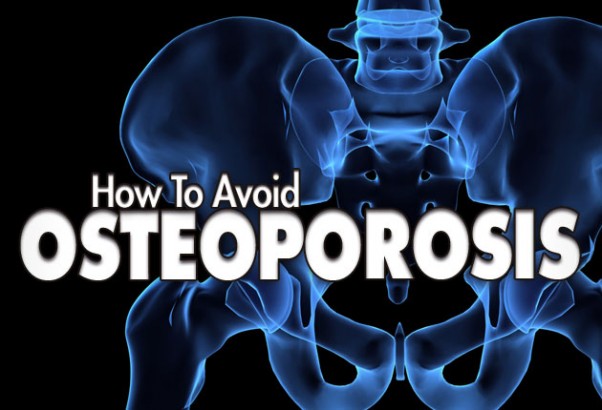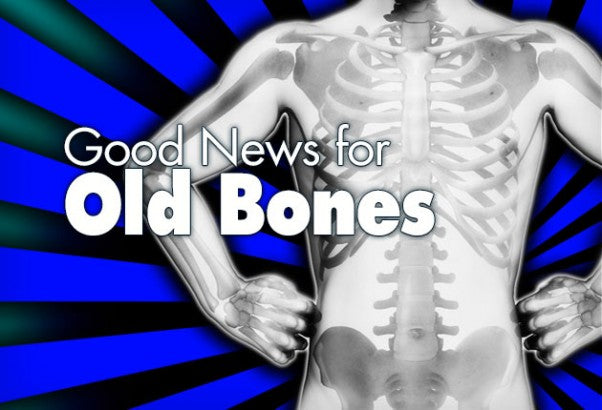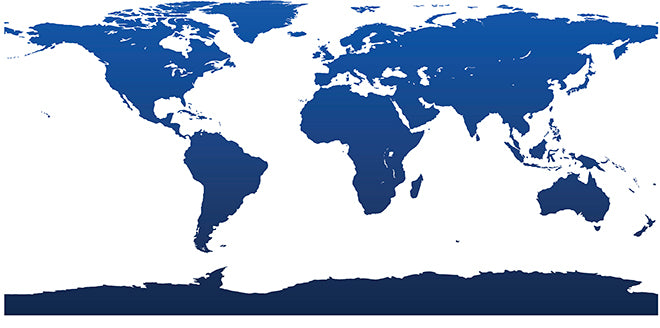With May being “Osteoporosis Awareness and Prevention Month” — and this week being National Women's Health Week — I thought it would be a perfect time to review what osteoporosis is, what causes it, and how you can avoid it!
Is Osteoporosis Avoidable?
Osteoporosis is a silent disease of affluence; a disease of the bones which literally means “porous bones.” It occurs over time, usually taking decades to develop, when a person loses too much bone, makes too little bone, or a combination of both. As the bones become porous, they become weak and can break easily from a minor fall or a simple bump into furniture or even sneezing! Women, due to having smaller bones overall, more prevalent hormone imbalances, and the effects of menopause as they age, are at much greater risk of suffering with osteoporosis than men with approximately one in four postmenopausal women having osteoporosis.
“Assuming osteoporosis and low bone mass prevalence remains unchanged, the study projects that by 2020, 10.7 million adults will have osteoporosis and 58.2 million will have low bone mass. By 2030, the numbers are expected to increase to 11.9 million adults with osteoporosis and 64.3 million with low bone mass.” Source: NOF Releases New Data Detailing the Prevalence of Osteoporosis (April 18, 2013)
Osteoporosis is the underlying factor in at least 2 million fractures each year, including 250,000 hip fractures. Hip fractures are the most catastrophic and lead either directly or indirectly to death in up to 20% of cases. For 50% of those who survive, long-term hospital stays and nursing home care may be required. One of the greatest risk factors of osteoporosis is dietary animal protein. You will note in Table 1 the corresponding prevalence of hip fracture with animal protein intake — a diet rich in animal source foods is an acid forming diet! Tragically, the closer a country is to the Standard American Diet (SAD) which is rich in animal protein, processed foods and a very minimal intake of fresh fruits and vegetables, the greater the risk for osteoporosis and broken bones. Table 1: (data taken from Eat to Live, Joel Fuhrman, M.D. Chart is not completely reproduced here - click the chart for a larger view)
Maintaining a diet consistent with the SAD over a long period of time leads to loss of bone density. When these animal based and processed foods are consumed and digested, most of the nutrients released into the blood stream are predominantly acidic. The body regulates the blood pH in a very narrow alkaline range around 7.35 to 7.45 which is slightly alkaline.
In order to maintain this critical alkaline blood pH, the body uses alkaline mineral reserves to buffer the pH.
With years of dietary abuse — highly acidic foods with few fruits and vegetables to supply the critical alkaline mineral needs — the body must resort to the next best source of alkaline minerals to maintain the blood’s critical pH. That source is the calcium reserves in the bones. Years of calcium withdrawal leads to a critical loss of bone density, leading to osteoporosis and the entailing consequences of the disease. The diet God gave mankind in Genesis 1:29 was 100% whole plant foods, a diet that is primarily alkaline forming, rich in minerals and other critical nutrients, and low in calories. It was — and still is today — the most ideal way to nourish the human body. It supplies the raw materials the body requires in order to maintain strong bones and health in all areas. The Hallelujah Diet is based on those principles! For more than 20 years, Hallelujah Acres has found that when we supply the conditions that are conducive to health and healing, the body will in almost all situations restore and maintain health. God has placed within the body self-healing that keeps us well when we meet all of the body’s needs.
Dietary Supplements to Help Avoid Osteoporosis
Sadly today, our foods are woefully deficient in the nutrition they contained just a few decades ago. In order to meet the body’s needs today and maintain the principles of Genesis 1:29, we find it important to utilize fresh vegetable juices, green smoothies and BarleyMax to insure a more optimal intake of whole food nutrients. In addition to enhancing the availability of nutrients from our whole foods, there are a few areas of supplementation that are critical, especially in supporting bone health.
Calcium and magnesium are two minerals that play a vital role in bone density. A diet rich in acid forming foods (meat, dairy, grains, and processed foods) is in reality a calcium depleting diet, robbing the body of more calcium than it supplies. Most of the population existing (not thriving) on the SAD are not only on a calcium depleting diet but a diet that is deficient in magnesium. Our green foods are rich sources of both calcium and magnesium! The nutrient dense foods are almost nonexistent or extremely deficient in the SAD. These nutrient-rich foods are predominant in The Hallelujah Diet and are essential for supporting bone health. Vitamin D not only helps regulate at least 200 genes, it is fundamental in supporting the body’s efficient utilization of calcium and magnesium.
Tragically, we live in a day in which we have been taught to fear the sunshine. We avoid the exposure to the sun that God intended. When we are out in the sunshine, we use sunscreen that blocks the UVB rays of the sun that are vital for the production of vitamin D. Those living in the northern hemisphere can’t produce vitamin D from sun exposure in the late fall and winter. Even in the southern parts of the country, with our often limited exposure to the sun, many of us will need to supplement with vitamin D3 in order to maintain optimal (50 to 80 ng.ml) blood levels of vitamin D.
Vitamin D is a fat-soluble nutrient (a hormone, really) and should be taken with a meal containing fat for maximum utilization.As mentioned earlier, magnesium is also important in supporting bone health. For those who are just starting The Hallelujah Diet, magnesium supplementation may be prudent in restoring the body’s magnesium and supporting bone health until the dietary magnesium intake is adequate to meet the ongoing needs of the body. Those following The Hallelujah Diet with a high intake of green foods usually have a good intake of magnesium and are not deficient.
“Magnesium stimulates a particular hormone, calcitonin, that helps preserve bone structure and draws calcium out of the blood and soft tissue back into the bones, preventing some forms of arthritis and kidney stones. Magnesium suppresses another hormone called parathyroid, preventing it from breaking down bone. Magnesium is required to activate an enzyme that is necessary to form new bone.” (The Magnesium Miracle, Carolyn Dean, M.D., N.D.)Vitamin K also found in green leafy vegetables (as K1) plays a vital role in bone mineralization. Low blood levels of vitamin K are common in those suffering from osteoporosis and bone fractures. With the low intake of green leafy vegetables on the SAD, it is easy to see how a deficiency develops. Vitamin K2 is also important for supporting bone health as well as cardiovascular health. Dietary intake is often inadequate, requiring supplementation. Supplementing with vitamin K2 can be an especially important nutrient in maintaining bone density. One other nutrient found in green leafy vegetables that may be responsible for the bone density protection they afford is the trace element boron. Boron has gained attention as being protective against osteoporosis.
“In one study, supplementing the diet of post-menopausal women with 3 mg of boron per day reduced urinary calcium excretion by 44% and dramatically increased the levels of 17-beta-estradiol, the most bioavailable active estrogen. It appears that boron is required to activate certain hormones, including estrogen and vitamin D. . . . A boron deficiency may contribute greatly to osteoporosis and to menopausal symptoms.” (Encyclopedia of Natural Medicine, 2nd edition, Michel Murray, N.D. and Joseph Pizzorno, N.D.)
The Importance of Exercise
Those familiar with Hallelujah Acres are well aware of the importance placed on exercise. Our lifestyles today are far from what they were in biblical days. Most of us have a sedentary lifestyle, with most of our time spent indoors. Lack of property exercise is one of (if not the most) important factors in contributing to low bone density and osteoporosis. Bone is dynamic living tissue made up of cells. These cells are constantly being broken down and rebuilt, even in adults! This normal bone metabolism is dependent upon the intricate interplay of nutritional factors previously discussed, hormonal factors (i.e. vitamin D), and bone utilization of these nutrients induced by physical demand upon the bones. When the bones are stressed under the load of weight-bearing and/or resistance exercise, the bones are signaled to draw in the available calcium, magnesium and other necessary nutrients for rebuilding of healthy bone cells. Thus, a pattern of consistent exercise through routine daily activity or a specific weight bearing exercise program is essential for maintaining bone density and warding off or recovering from osteoporosis.
If you are not already on a healthy, whole food, plant-based diet, try The Hallelujah Diet for at least 60 days as you begin to support your bone health and enjoy the many other benefits... you may want to make it a lifestyle change for the rest of your healthy life!







